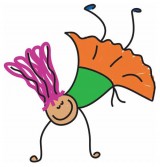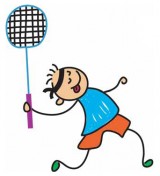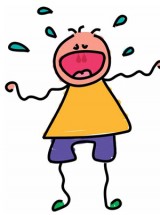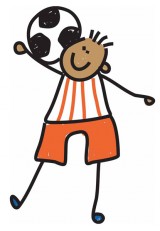Competitive PE lessons don't have to result in McEnroe-esque tantrums, say Gareth Long, Stuart Taylor and Harvey Grout...
Competition lies at the heart of sport. When the FIFA World Cup takes place later this year, it’s the teams’ desire to lift the trophy that will, ultimately, make the tournament such a compelling spectacle. It’s definitely why we – along with millions of others – will be glued to our television sets.
Whether it’s the World Cup or the Year 2 sack race, the only certainty in any competition is that there will be winners and losers; jubilation and dejection. But while its exciting to watch or participate in this kind of sporting drama, it can cause problems for teachers and pupils within the context of a PE lesson.
Watching a child throw a tantrum if they lose, or cheat to win, it can be tempting to avoid competition in physical education altogether. However, being able to compete is an important part of pupils’ development, and learning how to successfully handle winning and losing will stand them in good stead for later life.
Our suggestion is that is doesn’t have to be either/or. With a few adjustments, it’s possible to plan competitive PE lessons that will help pupils become accustomed to the highs and lows of victory and defeat, and also reduce tears!
 In this gymnastics warm up, the teacher begins by calling out a number. It’s then up to the children to form teams of a corresponding size and produce a group balance. The teacher awards points (lots of points!) to each team with marks for quickness, originality, difficulty, composition, etc. Pupils should remember their individual scores as they move away and await the next number.
In this gymnastics warm up, the teacher begins by calling out a number. It’s then up to the children to form teams of a corresponding size and produce a group balance. The teacher awards points (lots of points!) to each team with marks for quickness, originality, difficulty, composition, etc. Pupils should remember their individual scores as they move away and await the next number.
It is hoped that children will want to impress in order to gain points, but the focus will be taken away from comparing scores; the competition is evident, but the winning is not emphasised.
Try…
Awarding lots of points to ever-changing groups in your next warm up activity.
 Setting a friendly challenge for the whole class will allow children to experience competition whilst working together. For example, you could set up a group passing activity and lay down the gauntlet: “I bet you can’t go for twenty seconds without a ball touching the floor!’ Award points to the class each time they succeed, and points to yourself if they do not. This will also give you the chance to model how to handle losing in the correct manner.
Setting a friendly challenge for the whole class will allow children to experience competition whilst working together. For example, you could set up a group passing activity and lay down the gauntlet: “I bet you can’t go for twenty seconds without a ball touching the floor!’ Award points to the class each time they succeed, and points to yourself if they do not. This will also give you the chance to model how to handle losing in the correct manner.
Try…
Setting the whole class (or groups) a competitive challenge in your next PE lesson.
 Beating your own score can be just as motivating as trying to topple someone else from the top spot. For instance, in a multi-skills challenge children could be given 30 seconds to throw a ball against the wall and catch it as many times as possible. Can they double their own score if they carry out the same activity for a full minute?
Beating your own score can be just as motivating as trying to topple someone else from the top spot. For instance, in a multi-skills challenge children could be given 30 seconds to throw a ball against the wall and catch it as many times as possible. Can they double their own score if they carry out the same activity for a full minute?
Try…
Challenging your pupils to repeat/modify an activity in which they have to beat their own score.
 Even when pupils directly compete against each other, there is no need for arguments to break out! For example, introduce a lesson which encourages rallying in an ‘over the net’ game. The children play against each other to a set score (e.g. first player to 11 points) but there’s a twist. If a child loses 11-3, they begin the next game (against either the same or another pupil) on 3 points. If they lose this game 11-7, they begin the subsequent game on 7 points.
Even when pupils directly compete against each other, there is no need for arguments to break out! For example, introduce a lesson which encourages rallying in an ‘over the net’ game. The children play against each other to a set score (e.g. first player to 11 points) but there’s a twist. If a child loses 11-3, they begin the next game (against either the same or another pupil) on 3 points. If they lose this game 11-7, they begin the subsequent game on 7 points.
It is hoped that, by the end of the lesson, all pupils will have faced some toughchallenges and experienced victory at least once.
Try…
Using games, races, tournaments and competitions in your PE lessons but change the rules to ‘level the playing field’. Imagine a relay race; you may start teams at different times, you could ask some teams to run for longer distances, or some teams could even perform a task (e.g. bouncing a ball) whilst running.
Perhaps the best learning experiences are those which have not been easy. Avoiding competition in PE lessons may be the less demanding option, but it is possible to foster a competitive and motivating environment that prepares pupils for the inevitable victories and defeats they will face outside of school.
That’s not to say that there won’t still be the odd tantrum in your PE lessons (or, for that matter, in this year’s World Cup), but perhaps that’s an important part of the learning process?
Gareth and Stuart lecture on the Coach and Physical Education degree at the University College Plymouth, St Mark and St John whilst Harvey is a PGCE PE lecturer at The University of Southampton. They also publish Sport IQ that provides PE resources for Key Stages 1 and 2.
 How to set up a cross curricular world cup project…
How to set up a cross curricular world cup project…
Now that England has qualified for the 2010 FIFA World Cup, here are some ideas on how the tournament can provide motivating learning opportunities for your pupils.
Art and Design
Imagine that Great Britain entered a team into the World Cup (this may happen in future Olympic Games). Design the team’s football kit.
Citizenship
Look at the rules common to the game of football. Are there any other rules that the pupils think should be added to the game? How does FIFA try to encourage fair play and sportsmanship?
English
Record an exciting section of one of the games and play it to the pupils with the sound turned off. Ask the pupils to write and then verbalise a commentary to the clip.
Geography
Plot the World Cup stadiums on a map of South Africa. Find out information about the cities (e.g. average temperature in June, expected rain fall). Ask the pupils to compare this information with that of the countries who are playing at that stadium.
History
Show photos from each decade the World Cup has been held (the first World Cup was held in 1930). Ask the pupils to guess which year each photo represents. Then explore how the World Cups have changed and developed over time.
Maths
Use match statistics from some of the World Cup games. Ask pupils to present this information in a different format (e.g. bar charts, pie charts).
Music
Explore the use of music and songs by spectators in the stadiums (e.g. Brazilian drums). How does the venue and occasion influence the type of music?
Science
Plan an investigation into how the air pressure of a football would affect the speed that a ball could be kicked from a penalty.
How To Use Books To Help Children Cope With Life
Ace-English
Supporting parents with maths
Ace-Maths
How to use modelling to engage pupils with autism
Ace-Art-And-Design
